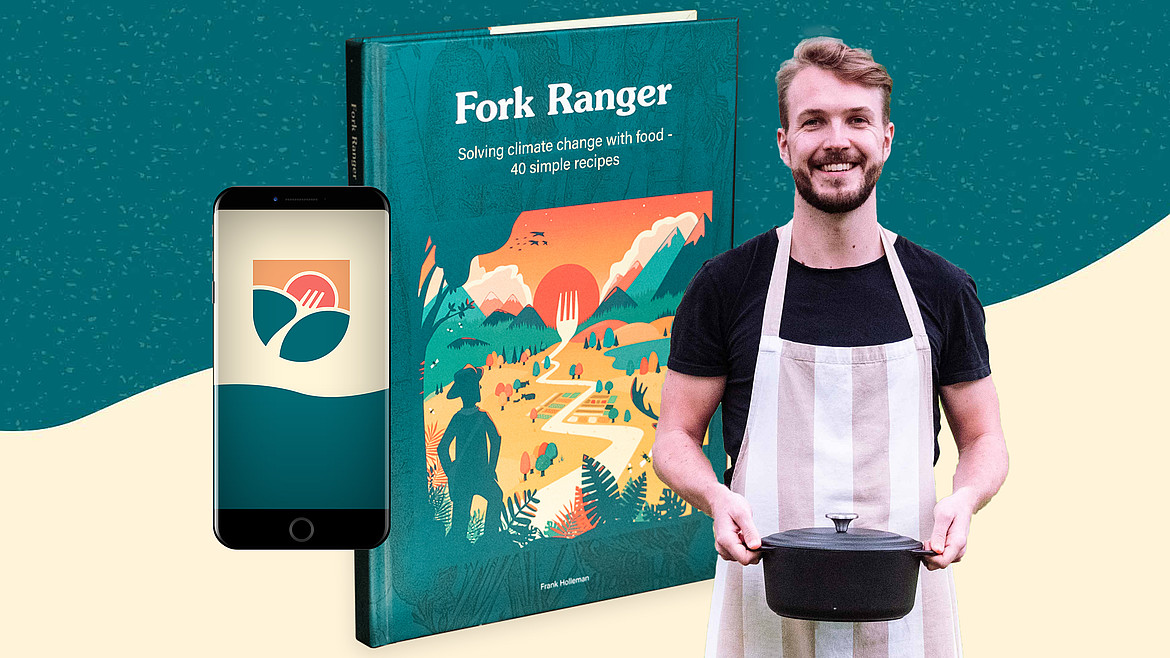Food as a weapon… for restoring ecosystems and fighting climate change! Alumnus Frank Holleman (MSc Business Administration 2016) knows that small changes to what we eat can have a much bigger effect on ameliorating climate change. Frank launched Fork Ranger in 2019 to show to show people who care about climate change how simple it is to consume less meat and what effect it can have. He is currently creating a book (financed through crowdfunding) of mostly vegetable-based recipes to be published in December 2019.
What is it about your effort that makes a positive change?
“We are bombarded with depressing doomsday facts; climate change is destroying the planet. I want to turn that around by showing people that they can live well with less meat; they don’t have to stop eating meat altogether. There is so much we can do with vegetables if we add a bit of creativity, it doesn’t mean spending more time and money as is often perceived. This is how we can make a large impact.
“Doing something about your food habits is easier than avoiding plastic! My recipe book is not made ‘by foodies for foodies’. I’m not a master chef and I don’t like complicated recipes, so I’m intentionally creating a recipe book for people who don’t want to spend a lot of time making their meals.”
Why do you do it?
“I’ve always had a respect for nature from growing up around it and being fascinated by adventure. When I read about climate change and how to tackle it, I realised how it could be possible, as long as you make changes slowly and don’t do it overnight.”
I don’t want to say all meat and dairy has to be banned, but we do need to make sure we can feed humans with the land that we have. So my philosophy is to make meat and dairy the special ingredient, instead of the staple. Take spaghetti Bolognese for example. Italians don’t consider this as a quick dish prepared in 30 minutes; they take a lot longer and use a lot of meat. In my recipe book, I experiment with making spaghetti Bolognese with vegetables as the core ingredient, and a little meat for flavour. I use a small amount of pancetta at the beginning – as the Italians do –and then using mushrooms and vegetables to create a filling dish. In this way, meat becomes the added value instead of the main ingredient.”
How can others get involved in doing something with you – or something like what you’re doing?
“I’m hoping that those who are already eating less meat or are interested in how to eat less meat will spread the message about how easy it is and it’s normal. I hear people say they don’t want to be categorised as ’vegetarian’ or ‘vegan’ because they don’t identify with either label. They are both sometimes branded as somehow feminine, and I want to encourage people to see this issue differently. If people hold back from eating a vegetable-based diet because it is seen as being ‘soft’, then the narrative or the brand needs to change.”
Frank has encouraging words for the younger generation: “It’s okay not to know what ‘your thing’ is, or what you’re meant to be doing. Just continue to work on something and learn from it, especially if it’s your first job. I’ve never heard anyone say their first job was great and allowed them to make the impact they wanted. What you learn and experience will probably come in useful later, so stay open to exploring new things. At some point you will feel like you’ve found your thing.”
